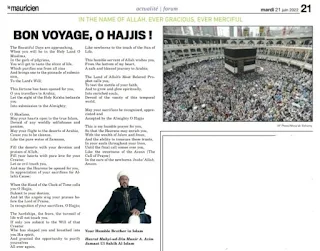In his Friday Sermon of 17 June 2022 ~16 Dhul Qaddah 1443 AH, Imam- Jamaat Ul Sahih Al Islam Hazrat Muhyiuddin Al Khalifatullah Munir Ahmad Azim (aba) of Mauritius continues the larger reflections on the spiritual maladies that afflict the Muslim psyche today: the mental attitudes and emotional roadblocks that prevent them from engaging with energy, vigour, enthusiasm and enterprise in the larger goals of Dawah (preaching and propagating Islam). In this discourse, Hazrat Khalifatullah (aba) points out how to think through the confusing maze of Muslim renewal in this complicated era.
As Hazrat Saheb (aba) alludes in the discourse, based on Qur'anic principles and Prophetic practices, the Sahaba-e-Kiram, the pure Companions of the Holy Prophet (sa) and the Tabi'un, the pious generations that followed them became living exemplars of the Faith in the early days of Islam, and wherever they went to preach the message of Tawheed, people en masse abandoned their pagan notions and embraced the Light of Islam in their midst. As time went by, and the original spirit of faith ebbed away; decadence and degradation have returned to the societies that were once 'Muslim'. And today, in the fifteenth century after the Holy Prophet (sa), the Muslims in general seem to be bereft of the true essence of Islamic teachings in their everyday lives. Even worse, far from upholding the spirit of Tawheed as Muslims, many among them have turned into tomb-worshippers; instead of praying God, they invoke the intercession of long-dead saints, just like the idol-worshippers performing rituals before the lords beside Allah (swt), [God forbid].
Against this dismal contemporary scenario of gross misunderstandings and corrupt religious practices, reclaiming the true teachings along with its progressive potential and transformative spirit is the larger responsibility of the lovers of Allah (swt), including common followers of the Faith today. Hazrat Khalifatullah (aba) notes that this task can only be achieved through sustained work involving every segment of the Muslim society, and not by the Ulama and others working in silos. Promoting goodness of every kind and forbidding the bad from spreading in society are the real tasks of everyone at their own levels- indeed, duties and responsibilities are attached to every 'Muslim'- the one who has surrendered his God-gifted free will and submitted his everything to the Divine commandments. Moreover, Tabligh, or striving in God's cause by communicating Divine message to people also entail the willingness to withstand hostilities and insults at the hands of unfair critics and enemies of the Faith, like the Prophets in the past has shown: with patience and fortitude, they preached and lived the message of God against all odds, and the strength of their conviction and the beauty of their character changed hearts and they became victorious in the battlefield of Dawah. It is by following in the footsteps of true lovers of the Faith and in adopting their strategies and steps of engagement with the people that we can make progress in the path of Dawah, indicates Hazrat Khalifatullah (aba) in this discourse.








